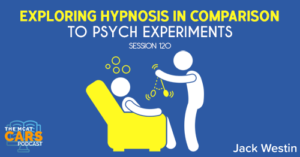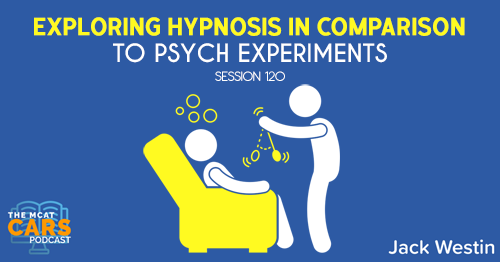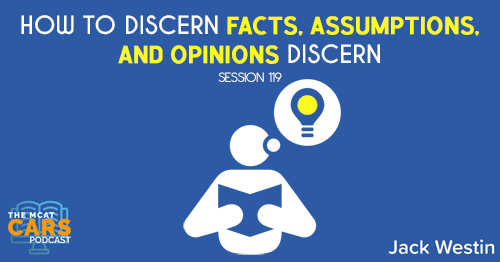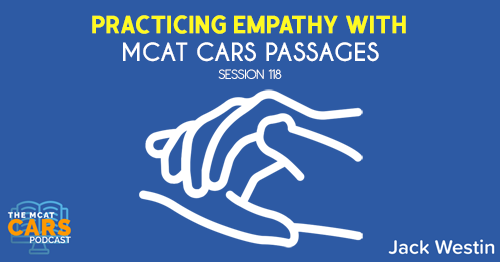Apple Podcasts | Google Podcasts
Session 120
Today, Jack and I focus on learning as we read this passage about hypnosis.
As always, I’m joined by Jack Westin from JackWestin.com. If you want more free practice for MCAT CARS, check out all their amazing free resources including a free trial session of Jack’s full course to see how it’s like learning from Jack Westin himself. They’ve got the Khan Academy resources using the actual MCAT interface as well.
Listen to this podcast episode with the player above, or keep reading for the highlights and takeaway points.
Link to the article:
Psychology has taken some hits in recent years—most famously in the form of the “replication crisis.” Multiple failures to reproduce high-profile findings prompted a reexamination of methods that can inadvertently generate apparently significant findings that are actually just statistical artifacts. Now a new challenge has arisen to a series of renowned psychological studies that purported to provide a window into how the brain processes internal representations of our physical “self.” The questioning of this research comes from an unlikely quarter: the study of hypnosis.
Long seen as a fringe topic, hypnosis has become surprisingly well established in the cognitive sciences today as a measurable, repeatable phenomenon. Hypnosis is the induction of a seemingly altered state of consciousness in which a person appears to relinquish voluntary control, becoming highly responsive to suggestion. Findings from hypnosis research show that the practice all boils down to how suggestible people are, which the researchers behind the new investigation call “trait phenomenological control.” Their paper suggests this trait may offer an alternative explanation for some key studies that invoke neural mechanisms underlying representation of the self or of the actions and experiences of others. The work also suggests new ways in which psychologists could improve the rigor and reliability of future studies.
The research began because lead author and hypnosis researcher Peter Lush and psychologist Zoltan Dienes, both at the University of Sussex in England, were intrigued by the knowledge that suggestion alone, without the theatrics associated with hypnosis, is enough to cause many people to act involuntarily, or experience things that are not happening, to some extent. “Once we’d started thinking of suggestion outside the context of hypnosis, it was natural to start thinking of other contexts in which suggestion effects might occur,” Lush says. One set of studies that came to mind were those involving embodiment—that is, ways that people perceive the physical self. These experiments used methods that can be seen as similar to hypnotic suggestions.
Suggestibility is closely related to a concept in psychology called “demand characteristics”—the tendency for study participants to figure out what researchers are expecting and respond accordingly. “We started wondering whether demand characteristics may be acting as implicit suggestions in experiments,” Lush says. The team started looking at well-known experiments that involved embodiment to determine whether participants were picking up on, and being influenced by, researchers’ expectations. “The idea was to test it in these embodiment effects—to then draw attention to the possibility that this could be going on all over the place,” Lush says. His group reported its results on September 25 in Nature Communications.
[05:28] Paragraph 1, Sentence 1
Psychology has taken some hits in recent years—most famously in the form of the “replication crisis.”
Jack says:
Replication means reproducing something. And a crisis, obviously, isn’t a good word. You don’t want to be in a state of crisis. So it’s definitely something related to psychology because it literally says psychology. And hopefully, they will explain what this exactly means.
[06:46] Paragraph 1, Sentence 2
Multiple failures to reproduce high-profile findings prompted a reexamination of methods that can inadvertently generate apparently significant findings that are actually just statistical artifacts.
Jack says:
We don’t really know what statistical artifacts are, but it seems like it’s not a good thing.
[07:21] Paragraph 1, Sentence 3
Now a new challenge has arisen to a series of renowned psychological studies that purported to provide a window into how the brain processes internal representations of our physical “self.”
Jack says:
We’re talking specifically about this set of studies about how we represent our “self.”
[07:47] Paragraph 1, Sentence 4
The questioning of this research comes from an unlikely quarter: the study of hypnosis.
Jack says:
So somebody was studying hypnosis and potentially found that this old data about the representation of our physical self was maybe misleading.
[08:23] Paragraph 2, Sentence 1
Long seen as a fringe topic, hypnosis has become surprisingly well established in the cognitive sciences today as a measurable, repeatable phenomenon.
Jack says:
The author assumes that everyone probably doesn’t appreciate hypnosis, as much as they should know. It’s an edge kind of topic and people don’t really care for it.
[09:17] Paragraph 2, Sentence 2
Hypnosis is the induction of a seemingly altered state of consciousness in which a person appears to relinquish voluntary control, becoming highly responsive to suggestion.
Jack says:
Everyone has an idea of what hypnosis is. But now the author is giving you a really exact definition and this is the definition you have to follow. Forget your own definition, your own bias, or your own perspective. You’re learning the author’s way of reading and understanding hypnosis, which is about being responsive to suggestions.
[11:47] Paragraph 2, Sentence 3
Findings from hypnosis research show that the practice all boils down to how suggestible people are, which the researchers behind the new investigation call “trait phenomenological control.”
Jack says:
It’s some more history of what hypnosis is and how it works. And you need these suggestible people.
[12:20] Paragraph 2, Sentence 4
Their paper suggests this trait may offer an alternative explanation for some key studies that invoke neural mechanisms underlying representation of the self or of the actions and experiences of others.
Jack says:
This follows the last paragraph that suggests we can look at the representation of ourselves, and maybe base it off hypnosis and not some other stuff.
And this is just suggesting the same thing, but it’s getting more specific. And it’s saying that it’s not just hypnosis, but also it’s the idea that you have this trait that makes you more suggestive towards certain things. So now, it’s consistent with the previous paragraph, but it’s getting more specific now.
[13:36] Paragraph 2, Sentence 5
The work also suggests new ways in which psychologists could improve the rigor and reliability of future studies.
Jack says:
It’s just some suggestion for future studies here.
[13:49] Paragraph 3, Sentence 1
The research began because lead author and hypnosis researcher Peter Lush and psychologist Zoltan Dienes, both at the University of Sussex in England, were intrigued by the knowledge that suggestion alone, without the theatrics associated with hypnosis, is enough to cause many people to act involuntarily, or experience things that are not happening, to some extent.
Jack says:
Again, just some research here by these two guys in England talking about the power of suggestion.
[14:25] Paragraph 3, Sentence 2
“Once we’d started thinking of suggestion outside the context of hypnosis, it was natural to start thinking of other contexts in which suggestion effects might occur,” Lush says.
Jack says:
Going back to the typical context of hypnosis, they said “without the theatrics associated,” which refers to the showmanship of it. It’s something the author suggests we don’t even need. Hypnosis has this other element that could still be relevant.
[15:19] Paragraph 3, Sentence 3
One set of studies that came to mind were those involving embodiment—that is, ways that people perceive the physical self.
Jack says:
It’s going back up to the very beginning where it talked about these studies on the physical self. And they’re still going back to it, but they’re calling it something else. They’re calling it embodiment. We’ve never heard of the word or term embodiment in this passage yet. So anytime they refer to an embodiment, that means the study of the self or at least the representation of ourselves.
[15:52] Paragraph 3, Sentence 4
These experiments used methods that can be seen as similar to hypnotic suggestions.
Jack says:
It seems like they’re not controlling for hypnotic suggestions because they’re not aware of them.
[16:16] Paragraph 4, Sentence 1
Suggestibility is closely related to a concept in psychology called “demand characteristics”—the tendency for study participants to figure out what researchers are expecting and respond accordingly.
Jack says:
Just a little bit of kind of psychology, research kind of structure, and how it’s done.
[16:43] Paragraph 4, Sentence 2
“We started wondering whether demand characteristics may be acting as implicit suggestions in experiments,” Lush says.
Jack says:
There’s this demand characteristic which seems like it’s actually more of the trait that they’re referring to with hypnosis. You’re trying to figure out what the researcher is wanting and trying to respond that way. Because you’re thinking, they’re suggesting you go down this direction.
[17:32] Paragraph 4, Sentence 3
The team started looking at well-known experiments that involved embodiment to determine whether participants were picking up on, and being influenced by, researchers’ expectations.
Jack says:
This is where the hypnosis people started digging into these other experiments.
[18:05] Paragraph 4, Sentence 4
“The idea was to test it in these embodiment effects—to then draw attention to the possibility that this could be going on all over the place,” Lush says.
Jack says:
They’re just expanding out saying a lot of psychology research is potentially flawed.
[18:25] Paragraph 4, Sentence 5
His group reported its results on September 25 in Nature Communications.
Jack says:
We have these researchers who are studying hypnosis, who then potentially drew some conclusions. They said a lot of psychology research may be affected by the power of suggestion, which is hypnosis that the psychology researchers probably aren’t tuned into.
And that’s the replication crisis. The crisis is we’re not accounting for controlling the element of hypnosis, even though it’s not even in the same format. Because the way we normally see hypnosis is this theatrical kind of showmanship.
[19:22] Main Idea
It’s a deeper passage. And you could easily get confused if you’re not following along and you understand exactly what hypnosis is defined. Because other people may not even define hypnosis as a suggestion. It might just be more of an actual controlling mechanism.
Suggesting is very different than actually controlling your mind. So the author’s actually saying they can convince you to go in a direction that they want via hypnosis.
Links:
Link to the article:
SEARCH SITE
SEARCH SITE
LISTEN FOR FREE












